It’s no longer a secret that apps have become a lucrative source of revenue for businesses around the world. While the number of apps has increased exponentially in the last few years, not all apps contribute to growing the user base and making money.
We have created this blog to share our insight into the app industry, backed by statistics and in-depth research to help businesses and developers navigate the complexities of the app world. Apart from making money from mobile apps, this post provides practical advice on how to use an app to build a sustainable business. The article primarily covers the following topics:
- The App market
- Importance of Apps for businesses
- Goals to achieve when building a mobile app
- App monetization
Today, mobile apps aren’t only limited to big brands. More products and tools are helping many small and medium-sized businesses to jump on the mobile app bandwagon.
The mobile app industry:
Currently, the mobile app economy is blooming at a voracious speed. The total app downloads statistics best describes the fact that the industry is thriving. As per Statista’s findings, there were a total of 197 billion app downloads in the year 2017 alone. This number is projected to rise to 352 billion by 2021.
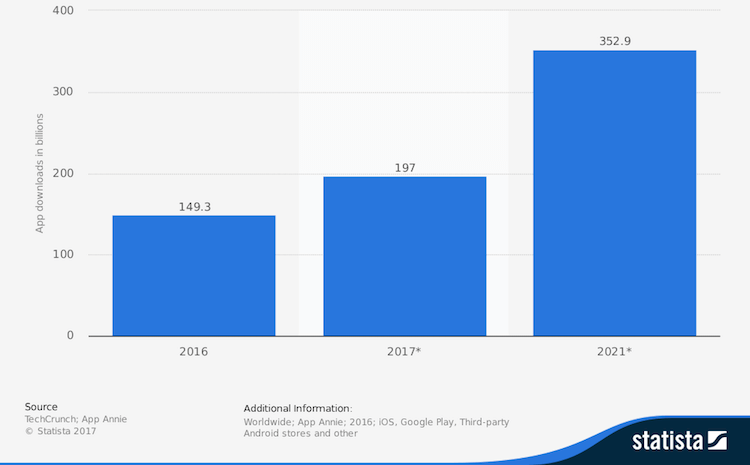
With the rate at which the number of apps is increasing, these stats shouldn’t come as a surprise. As of 2017 statistics, there are around 2.2 million apps available on the iOS app store. The Google Play Store, on the other hand, is home to 2.6 million Android apps while 1,300 more apps are added to the Play Store each day. Other small app stores such as the Amazon Appstore, Blackberry World, and Windows Store also contain over 1 million apps, which takes the total number of mobile apps to well over 5 million.
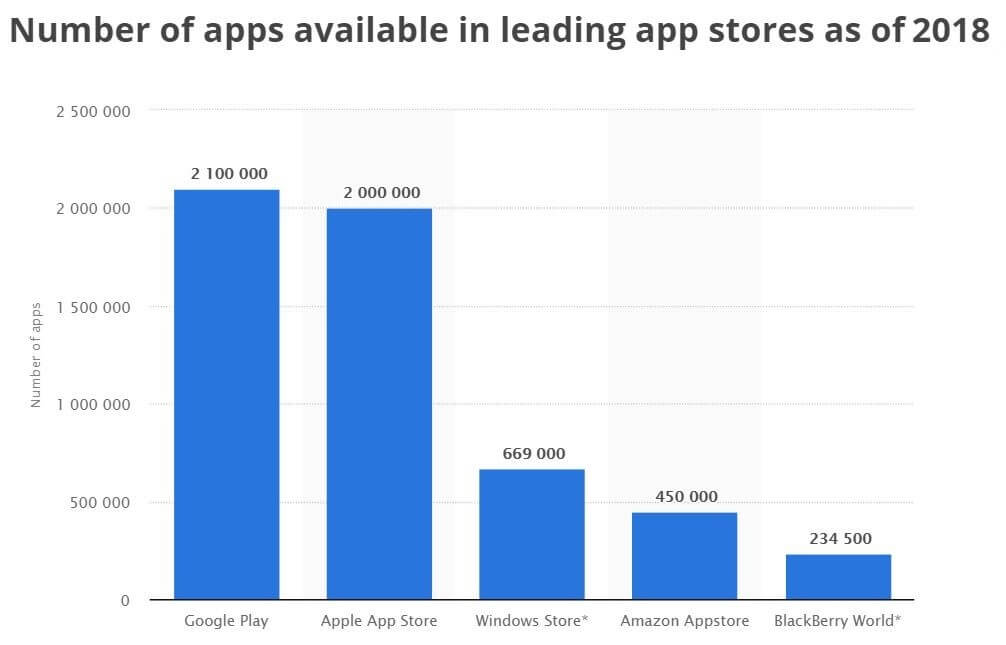
The convenience offered by mobile apps is a major reason behind the thriving app industry and mobile commerce. According to estimates, the global app economy would be worth $6.3 trillion which indicates that this is no more an industry one can belittle.
Importance of apps for businesses:
A survey by Cisco Consulting Services found that 55 percent of people said they use retail apps. An additional 34 percent of people claimed they use third-party apps to improve their shopping experience. The study reveals that more and more consumers want brands and retailers to develop mobile apps. By the end of 2018, around 37 percent of the population use a smartphone, which is expected to grow to 48 percent by 2021.
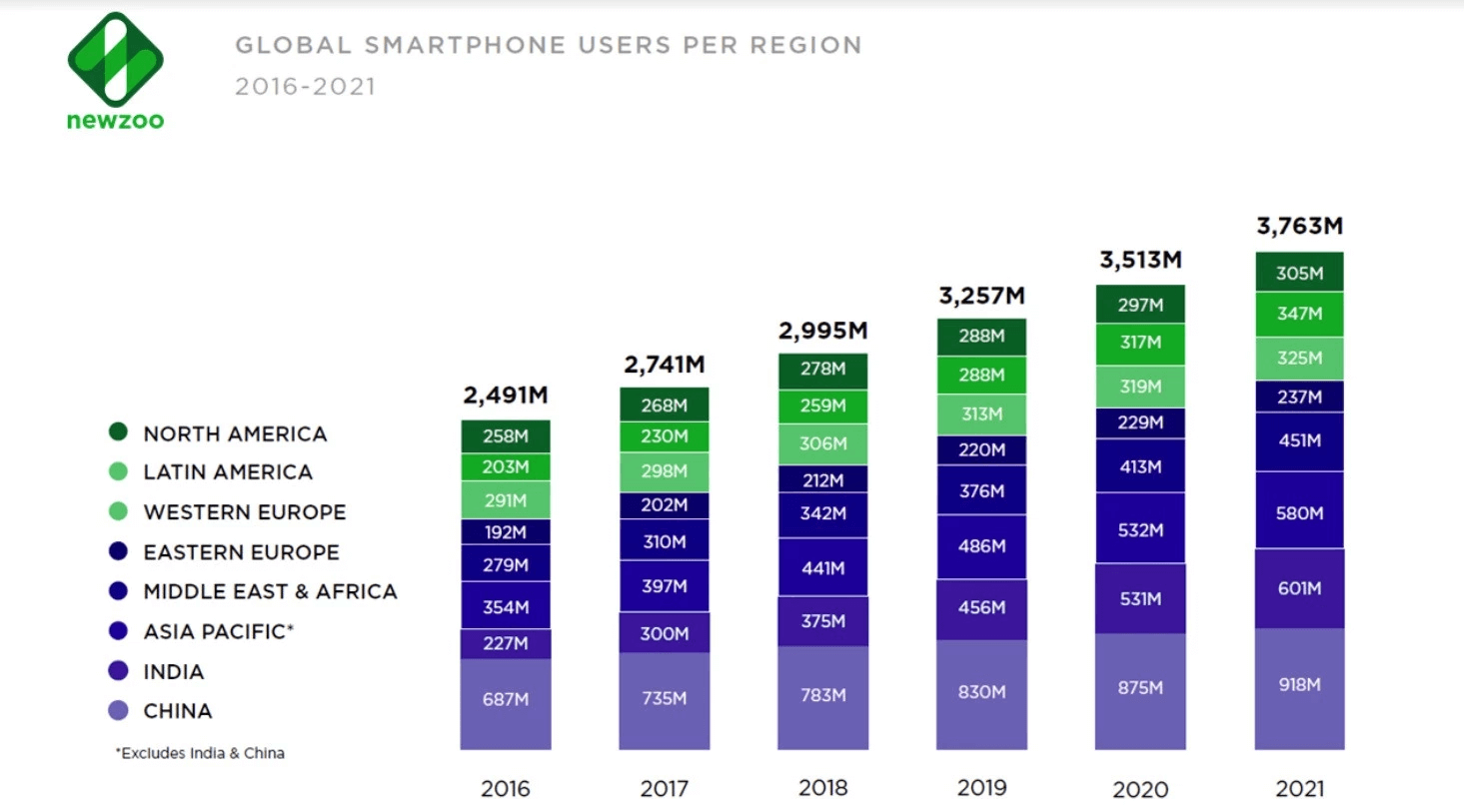
This presents a massive opportunity for businesses to put mobile first and optimize their content for mobile users. Moreover, it is noted that users prefer buying directly through a mobile application instead of a company’s website. Some of the reasons cited are convenience and enhanced customer satisfaction. Besides, users also want faster service which can be an issue in sites if they aren’t mobile optimized.
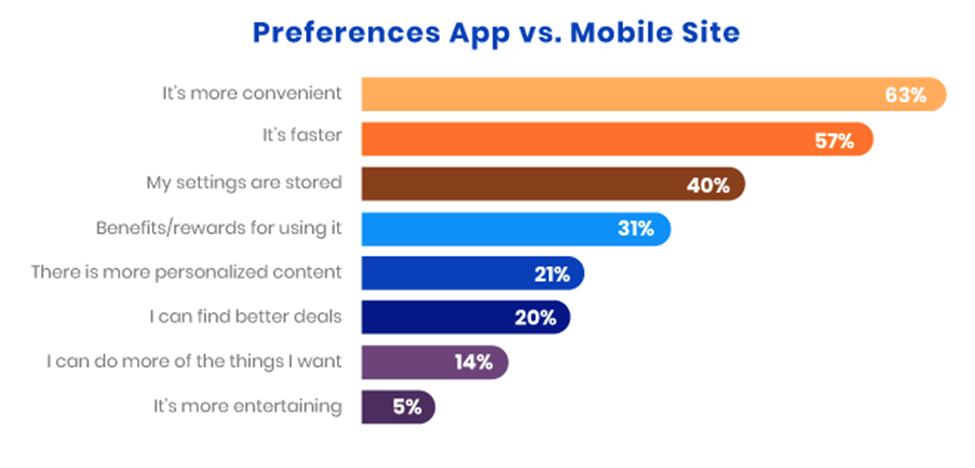
This is probably the reason why mobile apps are becoming a dominant form of communication with consumers. If your business has an active online presence with a good website and a mobile app, there are more chances consumers will interact with your business and purchase from you.
The following points further stress the importance of apps for businesses.
· Apps increase accessibility to a business:
A mobile app is an excellent tool for businesses to keep in touch with customers. If a company likes to inform customers of any general info, latest news, discounts, and promotions, it can use push notifications to do so. Push notifications bring businesses closer to consumers and keep them in constant contact. A study revealed that push notifications have good open rates.
· It increases customer engagement:
One of the primary reasons to create an app is to improve customer engagement experience. No matter the type and size of your business, your customers need an easy way to reach and engage with your business. An example is the OpenTable app which allows users to book a table at the restaurant. Since you’re making the customers’ life easy, they will definitely come back to your app.
· It improves the user experience:
Most successful apps interact and engage customers and provide an experience that lures them to buy your commodities and services. The review section on app stores indicates that mobile apps are easier to use than their respective websites. The AirG reviews, for example, highlight how comfortable it is to connect and use apps on your mobile devices. This further helps businesses to maximize their customer base.
· Cultivate customer loyalty:
Most importantly, mobile apps allow businesses to build a sincere relationship with customers. Customers today are surrounded by extensive advertising including billboards, flyers, brochures, TV ads, Facebook ads, and newspaper ads. In all the noise that is making us lose our impact on customers, a mobile app helps businesses provide a personalized experience to the users and influence their purchasing decisions.
· Apps provide valuable customer insights:
A mobile app offers various demographics and psychological insights on the customers that use the app. This is an invaluable source of data that gives you an idea about what factors drive the purchasing decisions and what modifications are required for increased conversions.
Goals of a mobile app/Apps’ usage:
Building a mobile app shouldn’t just come as a cool thing. Instead of following the latest trends, you should have a legitimate reason to build a mobile app. A survey conducted to find the goals that businesses want to achieve through an app revealed the following results:
- Increase sales
- Improve customer experience
- Stay competitive in the market
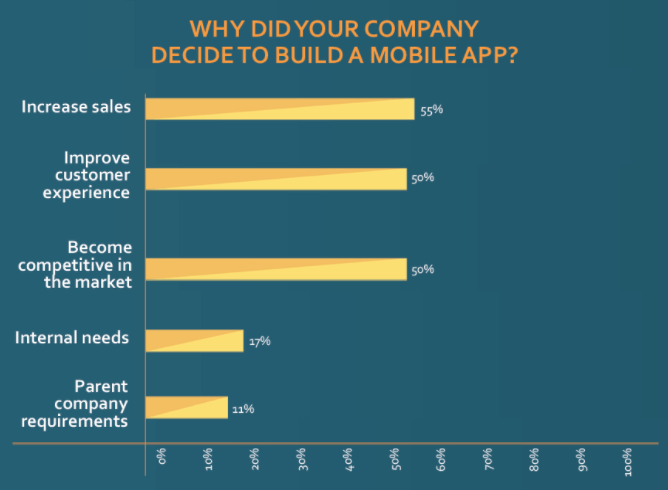
All these are great reasons for building a mobile app and keeping these in mind will guarantee the success of your business.
App monetization: Earning money through mobile apps
The big question to address after you build a mobile app is how are going to make money through the app? The remarkable growth of mobile apps has opened different revenue models. In this section, we will analyze different approaches you can follow to generate revenue through a mobile app. We will cover the monetization strategies including;
- Paid apps
- Freemium model
- In-app purchases
- In-app advertisements
- In-app subscription
- Sponsorship
Choosing the appropriate monetization model is often a difficult decision as you’ll need to generate revenue while keeping the quality and user experience intact. To help you navigate this difficult terrain, we have also compiled the pros and cons of each approach will enable you to find the best strategy to make money from app.
· Paid:
The paid model is the simplest model as you charge the user a specific amount of money for downloading your app. The service provider (the app store) also gets its share from every purchase.
online pharmacy purchase zovirax online best drugstore for you
Generally, 70 percent of the money goes to the app developer while 30 percent goes to the platform.
Pros:
- This is a classic and proven monetization method
- The model is very straightforward because the revenue is proportional to the downloads
Cons:
- You are less likely to reach out to more users with paid apps
- Paid apps are less likely to be downloaded by users. It’s reported that 4 in 5 paid apps in the Play Store have less than 100 downloads
- The paid model often underperforms other monetization models because users tend to try an app before they pay for it.
As a result, the paid model is rapidly losing ground to the In-app purchase and Freemium models. According to Mobile analytics provider, over 80 percent of apps were offered free of charge between 2010-12 which raised to 90 percent in 2013.
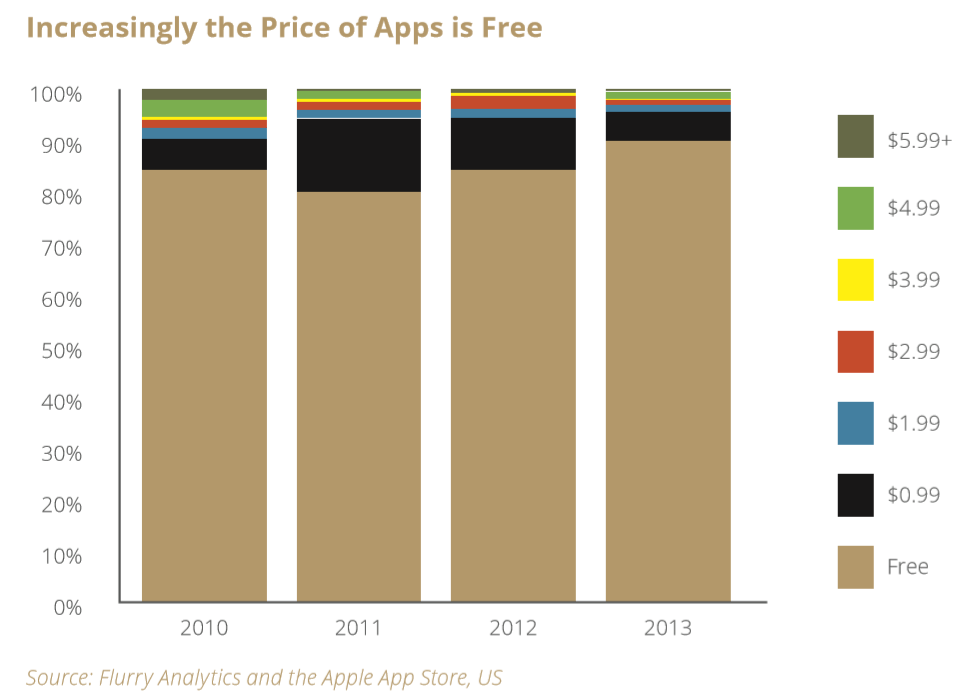
· Freemium:
In the Freemium model, you offer the basic form of app free of charge and make the full features of the app available upon some payment. This model is becoming popular because people are willing to pay for an app if it meets their needs.
Pros:
- The Freemium model addresses some of the shortcomings of the Paid model as it removes the friction (aversion to payment). It distributes the app with limited functionality for free and then convinces the users to pay a certain amount of money for the ‘pro’ version.
Freemium can drive initial traffic, but it has its downsides.
Cons:
- A core drawback is that the developer intentionally provides inferior service to the free customers
As per the reports of App Annie – a leading provider of app ranking and mobile analytics – Freemium apps are outpacing premium apps in revenue growth, both in iOS and Android Play Store.
· In-app purchase:
Like Freemium, In-app purchase offers a free and basic version of the app, while extra features are available upon extra payments. Similar to Freemium, in-app purchase is well suited to productivity and utility apps and games – especially those that offer virtual goods or in-game enhancements that need to be continuously refreshed.
This model was first introduced in Apple’s App Store in October 2009 with the release of iOS 3.0. Google made its version of IAP, called In-app billing, available to Android users later in March 2011.
Pros:
- If done the right way, In-app purchases can bring recurring revenue from your existing customer base
- This model paves the way for app developers to give their app for free and make money on anything from unlocking features and extra levels to removing ads and adding extra stylistic themes
Cons:
- It’s hard work to lure customers into spending money in your app
- There is a long list of restrictions around what you can sell, how and how often
- You need to understand the user habits and behavior inside your app, which will require some time and effort
According to research from Distimo, the In-app purchases are on the rise. In 2013, around 76 percent of all Apple App Store’s revenue was generated by IAP, while the figure was almost 90 percent for Asian markets.
· In-app ads:
In-app advertising is a popular method to make money from an app. It greatly varies according to your audience and the platform you use. Currently, the two widely spread networks are Apple’s iAds and Android’s Admob. You can make a few dollars per hundreds of downloads; however, it depends upon the type of your app and your audience.
Online advertising is playing a role in revenue generation, and it is only growing from here. Reports suggest that around 95 percent of Google’s revenue comes using this model. A report from IHS Markit also predicted that by 2020, the in-app ads would produce over $50 billion of revenue a year.
While using this model, you get paid on cost per click (CPC) or cost per impression (CPM) basis. Both CPC and CPM varies depending on how many people click on the app and the overall situation of the market.
· In-app subscription:
This model is similar to freemium; the only difference is that it offers a limited amount of content for free. To get full access, users require a paid subscription which produces money for the app developer. This type of monetization strategy best suits blogs and news sites that have a steady readership.
· Sponsorship:
This is a relatively new monetization strategy and requires an active user base to succeed. It is an effective tool because the developer gets a chance to earn money and also enlarge the user base.
online pharmacy purchase orlistat online best drugstore for you
This model tries to find advertisers and work with them to sponsor your app. The sponsorship is profitable for both sides because the revenue generated is split between the brand and the sponsor.
An example of the sponsorship model is the RunKeeper – an app which was later acquired by the running shoe company Asics.
Conclusion:
There are plenty of ways in which businesses can make money from mobile apps. However, app developers should remember that your app will earn money only if people use it. So, for a lucrative app business, you will need to understand your audience and the market situation and create an app based on the available data.


